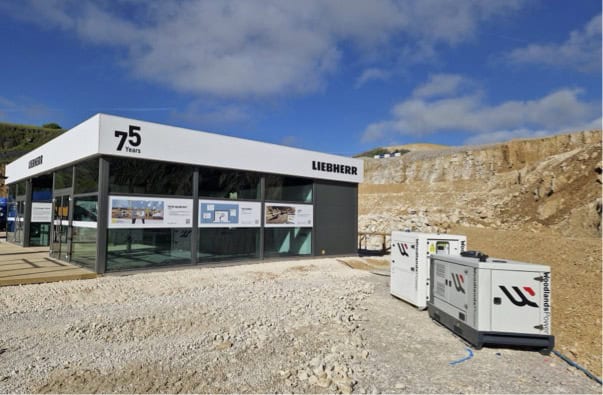Cost and carbon efficiency in a challenging environment

Our client, a specialist construction and plant hire contractor with extensive experience providing high-quality plant equipment and support services to large-scale projects, challenged us to deliver a power solution that could operate in a remote, live quarry environment. This month-long solution would be subject to extended periods of low-load operation and had to create minimal noise and emissions.
Our customer was supporting their client’s participation in one of Europe’s largest exhibitions of plant and equipment. Power was required for small-power operations, CCTV systems, security setups, and catering facilities. Once the stand was built and the show commenced, the energy demands would become more variable, necessitating a power solution that could adapt to fluctuating loads while maintaining high reliability.
We were tasked with delivering a hybrid power solution that could operate in a remote, live quarry environment, with extended periods of low-load operation and minimal noise and emissions. To do this, we provided a Stage 5 generator paired with a lithium-ion battery energy storage system (BESS). Advanced emission control technology meant the generator was compliant with stringent environmental standards. It also ensured minimal noise and emissions during the build phase and exhibition.
The BESS was integrated to provide a hybrid solution, charging from the generator during low-demand periods and discharging during higher-demand periods. This helped balance the power load efficiently, reducing fuel consumption while ensuring reliability. Commissioning support at the outset of the project ensured the system was set up for optimal performance.
By incorporating the hybrid power solution, the client experienced significant cost savings on fuel and a reduction in carbon emissions, compared to running a traditional generator-only solution.
The hybrid system reduced fuel consumption by 121.50 litres per week, which totals 486 litres over the four-week period. This led to a total estimated fuel saving of £194.40 per week, amounting to £777.60 over 4 weeks*. The reduction in fuel consumption resulted in a CO2 saving of 335.34 kg per week which totals 1,341.36 kg of CO2 saved over the four-week period.
* The results are based on a typical generator using diesel fuel at £1.50/litre operating at 50% average load, with the generator running 50% of the time and the battery system handling the other 50% of the load. These results exclude the rental cost of the hybrid power system, which should be factored in when calculating overall savings. The figures provided are estimates and vary depending on actual load profiles
